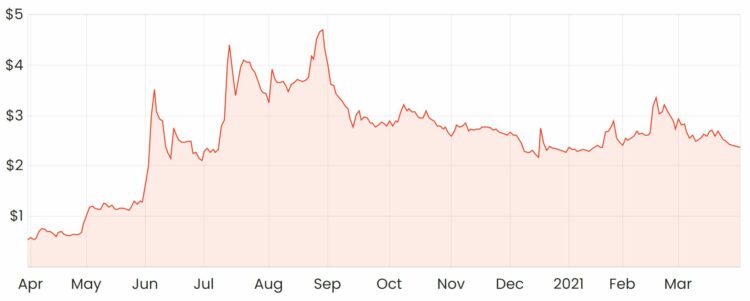Yesterday, buy-now-pay-later (BNPL) company Openpay Group Ltd (ASX: OPY) announced an additional $67.5 million funding package to support its international growth strategy.
Openpay’s share price finished the day 1.66% lower at $2.37 per share, but it has still returned over 400% in the last twelve months.
The valuations of many other BNPL companies have trended downwards recently, including Afterpay Ltd (ASX: APT), Zip Co Ltd (ASX: Z1P), Sezzle Inc (ASX: SZL) and Splitit Ltd (ASX: SPT).
OPY share price

Funding package details
In total, around $67.5 million will be provided to the company. This will comprise a $37.5 million placement, a $25 million corporate debt facility, and a $5 million share purchase plan for existing and eligible shareholders.
Under the placement, around 18.5 million new shares will be issued at a price of $2.03, which represents a discount of roughly 15.8% to the current share price.
This seems to be the most likely explanation for the slight drop in Openpay’s share price yesterday.
This announcement comes just days after it revealed it had secured an agreement with global payments provider, Worldpay from FIS, part of the global financial products, and services group Fidelity National Information Services Inc (NYSE: FIS).
The funding will mostly be put towards Openpay’s US, UK and Australian expansion plans and will enable the company to build on its recent partnerships.
International expansion continues
The UK opportunity continues to be a focal point that will involve the tech integration into ezyVet’s cloud-based veterinary practise software to deliver UK healthcare vertical market entry.
Openpay also intends to expand into other verticals including broader healthcare, automotive, and home improvement.
Management has said due to higher values and longer plans, this ideally will result in stickier customers and higher average transactions.
Time to buy Openpay shares?
As my colleague, Raymond Jang pointed out in his article, Openpay is attempting to stand out from other BNPL companies by offering its product across various verticals including healthcare and automotive.
These segments are typically lower volume, although attract a higher merchant fee due to a higher average transaction value compared to retail as an example.
Offering BNPL for less discretionary purchases may provide some protection against underlying economic conditions, although I’m not sure if this would be considered a sustainable competitive advantage.
For more share ideas, click here to read: 2 high-quality ASX retail shares to watch in April.
I’d also recommend signing up for a free Rask account to get access to our stock reports.









